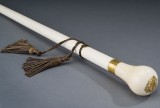The D.C. Boarding House That Moved the Needle on Slavery
Where Abolitionists and Congressmen—Including Lincoln—Dined, Debated, and Became Bedfellows
In the early 1840s, where the steps of the Library of Congress now stand, a group of American abolitionists gathered in a modest boardinghouse to plot the destruction of slavery.
The house belonged to a relatively obscure Washingtonian, a widow named Ann Sprigg. In those days, boardinghouses like Sprigg’s were fixtures of the capital landscape—where congressmen, senators, government officials, and the like tended to live during legislative sessions. Quarters were often cramped. Men rented a room—or just a bed, or even half of a bed—and communed in shared bathrooms and living …










